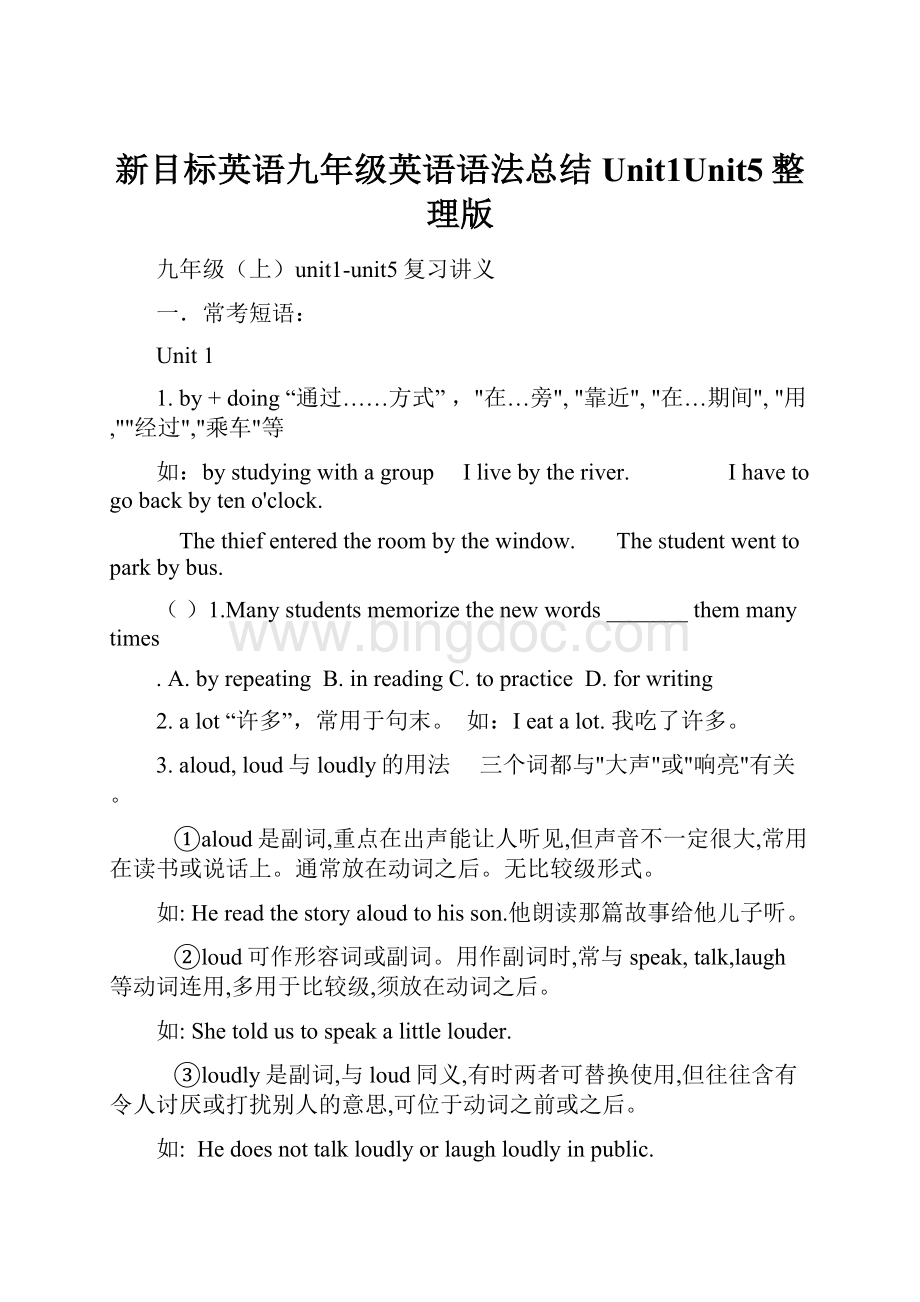新目标英语九年级英语语法总结Unit1Unit5整理版.docx
《新目标英语九年级英语语法总结Unit1Unit5整理版.docx》由会员分享,可在线阅读,更多相关《新目标英语九年级英语语法总结Unit1Unit5整理版.docx(17页珍藏版)》请在冰点文库上搜索。

新目标英语九年级英语语法总结Unit1Unit5整理版
九年级(上)unit1-unit5复习讲义
一.常考短语:
Unit1
1.by+doing“通过……方式”,"在…旁","靠近","在…期间","用,""经过","乘车"等
如:
bystudyingwithagroup Ilivebytheriver. Ihavetogobackbyteno'clock.
Thethiefenteredtheroombythewindow. Thestudentwenttoparkbybus.
()1.Manystudentsmemorizethenewwords_______themmanytimes
.A.byrepeatingB.inreadingC.topracticeD.forwriting
2.alot“许多”,常用于句末。
如:
Ieatalot.我吃了许多。
3.aloud,loud与loudly的用法 三个词都与"大声"或"响亮"有关。
①aloud是副词,重点在出声能让人听见,但声音不一定很大,常用在读书或说话上。
通常放在动词之后。
无比较级形式。
如:
Hereadthestoryaloudtohisson.他朗读那篇故事给他儿子听。
②loud可作形容词或副词。
用作副词时,常与speak,talk,laugh等动词连用,多用于比较级,须放在动词之后。
如:
Shetoldustospeakalittlelouder.
③loudly是副词,与loud同义,有时两者可替换使用,但往往含有令人讨厌或打扰别人的意思,可位于动词之前或之后。
如:
Hedoesnottalkloudlyorlaughloudlyinpublic.
4. be/getexcitedaboutsth.=be/getexcitedaboutdoingsth. =beexcitedtodosth.对…感兴奋
如:
Iam/getexcitedaboutgoingtoBeijing.=IamexcitedtogotoBeijing.
5.①endupdoingsth 终止做某事,结束做某事
如:
Thepartyendedupsinging.
②endupwithsth. 以…结束
如:
Thepartyendedupwithhersinging.
6. firstofall首先 tobeginwith一开始 lateron后来
7.takenotes做笔记,做记录
8.makeup组成、构成
9.oneof+(the+形容词比较级)+名词复数形式 …其中之一
如:
Sheisoneofthemostpopularteachers.
10.It's+形容词+(forsb.)todosth.(对于某人来说)做某事…
如:
It'sdifficult(forme)tostudyEnglish.
句中的it是形式主语,真正的主语是tostudyEnglish
11.unless假如不,除非,引导条件状语从句
如:
Youwillfailunlessyouworkhard..
Iwon'twriteunlesshewritesfirst.
12.dealwith处理
如:
Idealtwithalotofproblem.
13.goby(时间)过去
如:
Twoyearswentby.两年过去了。
14. seesb./sth.doing看见某人正在做某事,强调事情正在发生
seesb./sth.do 看见某人做完某事,强调事情已经结束
如:
Shesawhimdrawingapictureintheclassroom.
15.eachother彼此
16.regard…as…把…看作为….
如:
TheboysregardedAnnaasafool.
17.toomany 许多,修饰可数名词 如:
toomanygirls
toomuch 许多,修饰不可数名词如:
toomuchmilk
muchtoo 太,过于,修饰形容词 如:
muchtoobeautiful
18.change… into… 将…变为…
如:
Themagicianchangedthepenintoabook.
19.withthehelpofsb.=withone'shelp在某人的帮助下
如:
withthehelpofLiLei==withLiLei'shelp
20.compare…to… 把…与…相比
如:
CompareyoutoAnna,youarelucky.
21.instead代替,用在句末,副词(字面上常不译出来)
insteadofsth./doingsth.代替,后面接名词,代词或v-ing
如:
LastsummerIwenttoBeijing.ThisyearI'mgoingtoShanghaiinstead.
Hestayedathomeinsteadofgoingswimming.
Unit2
1.usedtodosth.过去常常做某事
否定形式:
didn'tusetodosth./usednottodosth.
如:
Heusedtoplayfootballafterschool. Didheusetoplayfootball?
Yes,Idid.No,Ididn't.
2.反意疑问句
陈述句中含有否定意义的词,如:
little,few,never,nothing,hardly等。
其反意疑问句用肯定式。
如:
HeknowslittleEnglish,doeshe?
Theyhardlyunderstoodit,didthey?
3.害怕… beterrifiedofsth. 如:
Iamterrifiedofthedog.
beterrifiedofdoingsth.如:
Iamterrifiedofspeaking.
4.on副词,表示(电灯、电视、机械等)在运转中/打开,其反义词off.
如:
withthelighton灯开着
5.花费take,cost,spend,pay
sth.take(sb.)timetodosth. 如:
Ittook(me)10daystoreadthebook.
sth.cost(sb.)…… 如:
Thebookcost(me)100yuan.
sb.spend…onsth. 如:
Shespent10daysonthisbook.
sb.spend…doingsth. 如:
Shespent10daysreadingthisbook.
sb.pay…forsth. 如:
Shepaid10yuanforthisbook.
6.chatwithsb.与某人闲聊
7.worryaboutsb./sth.担心某人/某事 worry是动词
beworriedaboutsb./sth.担心某人/某事 worried是形容词
8.inthelastfewyears.在过去的几年内,常与完成时连用
如:
IhavelivedinChinainthelastfewyears.
9.howtoswim怎样游泳
不定式与疑问词连用:
动词不定式可以和what,which,how,where,when等引导的疑问句连用,构成不定式短语。
如:
Thequestioniswhentostart.问题是什么时候开始。
Idon'tknowwheretogo.我不知道去哪。
10. makesb./sth.+形容词 makeyouhappy
makesb./sth.+动词原形 makehimlaugh
11.itseemsthat+从句 看起来好像…
如:
Itseemsthathehaschangedalot.
12..as+形容词./副词+assb.could/can尽某人的…能力
如:
Sheran/runsasfastasshecould/can.她尽她最快的能力去跑。
13.getintotroublewith遇到麻烦
14.intheend最后
15.makeadecision下决定
16.toone'ssurprise令某人惊讶
17.takeprideinsth.以…而自豪
如:
Hisfatheralwaystakeprideinhim.
18.payattentiontosth.对…注意,留心
如:
Youmustpayattentiontoyourfriend.
19.giveupdoingsth.放弃做某事
如:
Myfatherhasgivenupsmoking.
20.不再 ①nomore=nolonger
如:
Iplaytennisnomore/longer.
②not…anymore=not…anylonger
如:
Idon'tplaytennisanymore/longer.
Unit3
1.语态:
①英语有两种语态:
主动语态和补动语态
主动语态表示主语是动作的执行者,被动语态表示主语是动作的承受者
②被动语态的构成:
由"助动词be+及物动词的过去分词"构成
助动词be有人称、数和时态的变化,其变化规则与be作为连系动词时完全一样。
时态
被动语态结构
例句
一般现在 时
am
are+过去分词
is
Englishisspokeninmanycountries.
一般过去 时
was+过去分词
were+过去分词
Thisbridgewasbuiltin1989.
情态
动词
can/should
may +be+过去分词
must/……
Theworkmustbedonerightnow.
③被动语态的用法
当我们不知道谁是动作的执行者,或者没有必要指出谁是动作的执行者,或者只需强调动作的承受者时,要用被动语态。
1.Alltheemployeesexceptthemanager______toworkonlineathome.
A.encourages B.encourage C.isencouraged D.areencouraged
解析:
主语是alltheemployees(复数),而不是themanager,排除答案A和C;又因alltheemployees与encourage是被动关系,要用被动语态,排除B,故选D。
2.Alibrarywithfivethousandbooks_______tothenationasagift.
A.isoffered B.hasoffered C.areoffered D.haveoffered
解析:
alibrary是offer的承受者,要用被动语态,排除B和D;又因主语(library)是单数,排除C;故选A。
注意:
withfivethousandbooks是alibrary是定语。
将语态与虚拟语气结合起来命题
—Don’tyouthinkitnecessarythathe______toMiamibuttoNewYork?
—Iagree,buttheproblemis______hehasrefusedto.
A.willnotbesent;that B.notbesent;that
C.shouldnotbesent;what D.shouldnotsend;what
解析:
因he与send是被动关系,排除D;又因it(is)necessary后的that从句的谓语要用“(should+)动词原形”,排除选项A;答句中的表语从句不缺任何句子成分,用that;故选B。
将语态与倒装结合起来命题
Onlyaftermyfriendcame______.
A.didthecomputerrepaired B.berepairedthecomputer
C.wasthecomputerrepaired D.thecomputerwasrepaired
解析:
因thecomputer与repair是被动关系,排除A;又因only加状语置于句首,要用部分倒装,排除选项D和B;故选C。
将固定短语中的名词作主语来增加句子理解难度
Goodcaremust______babies,particularlywhiletheyareill.
A.take B.takeof C.betaken D.betakenof
解析:
由固定短语takegoodcareof(好好照看)是可知,goodcare与take是被动关系,排除A和B;选项C中又漏掉了of;故选D。
在语境中将语态与时态结合起来命题
1.Thenumberofdeathsfromheartdiseasewillbereducedgreatlyifpeople______toeatmorefruitandvegetables.
A.persuade B.willpersuade C.bepersuaded D.arepersuaded
解析:
因people与persuade是被动关系,排除A和B。
又因为主语是一般将来时,条件句中用一般现在时,所以选D。
2.Hundredsofjobs______ifthefactorycloses.
A.lose B.willbelost C.arelost D.willlost
解析:
因lose与jobs是被动关系,排除A和D;又因条件状语从句是一般现在时,主句中的谓语动词应当是一般将来时,故选B。
3.Withmoreforestsbeingdestroyed,hugequantitiesofgoodearth______eachyear.
A.werewashedaway B.isbeingwashedaway
C.arewashingaway D.arebeingwashedaway
解析:
因goodearth(沃土)与washaway(冲走)是被动关系,排除C;又因quantitiesof…作主语,谓语动词用复数,排除B;指近阶段(近些年)正在发生的事,用现在进行时,排除A;故选D。
4.—Thewindowisdirty.—Iknow.It______forweeks.()
A.hasn’tcleaned B.didn’tclean C.wasn’tcleaned D.hasn’tbeencleaned
解析:
由is和forweeks可知,要用现在完成时态,排除B和C;又因It(Thewindow)与clean是被动关系,要用被动语态,所以选D。
5.—GeorgeandLucygotmarriedlastweek.Didyougotothewedding?
—No,I______.Didtheyhaveabigwedding?
A.wasnotinvited B.havenotbeeninvited
C.hadn’tbeeninvited D.didn’tinvite
解析:
因为I与invite是被动关系,又因为邀请应当发生在结婚之前,gotmarried是过去,invite就该是过去的过去,所以用过去完成时的被动语态,只有C正确。
6.ThemayorofBeijingsaysthatallconstructionworkfortheBeijingOlympics_____by2006.
A.hasbeencompleted B.hascompleted
C.willhavebeencompleted D.willhavecompleted
解析:
因“by+将来时间”通常与将来完成时连用,所以由by2006可排除A和B;又因为work与complete是被动关系,所以要被动语态,只有C正确。
7.Becarefulwhenyoucrossthisverybusystreet.Ifnot,youmay______runoverbyacar.
A.have B.get C.become D.turn
解析:
you与runover是被动关系,选项中只有get才可与过去分词run构成被动语态,故选B。
当不知道或没有必要指出动作的执行者时,常用被动语态,这时往往不用by短语。
Thefrontwindowintheclassroomwasbrokenyesterday.昨天,教室的前窗被打破了。
(不知谁打破的)
Theyhavebeenpoorlypaid.他们的工资太低。
(没必要指出工资是谁付的)
突出或强调动作的承受者,如果需要说出动作的执行者,用by短语。
Thetime-tablehasbeenchanged.时间表已变动了。
(要突出的是“时间”)
Thesebooksarewrittenespeciallyforchildren.这些书是专门为孩子们写的。
(强调的是“”这些书)
为了使语言得体或圆滑等不愿意说出动作的执行者。
如:
Youarerequestedtomakeaspeechatnextmeeting.请您在下次会议上作个发言。
Itissaidthatsheisgoingtobemarriedtoaforeigner.据说她要嫁给一个外国人。
出于修辞的原因,或是说为了更好地安排句子。
如:
Itisgenerallyconsideredimpolitetoaskone’sage,salary,marriage,etc..问别人的年龄、工资、婚姻状况等通常被认为是不礼貌的。
Thenotionisespeciallyopposedtobythosewhohaveinvestedmuchinthearea.这个提议特别遭到了那些在本地区投资很大的人的反对。
(因those的定语太长了,若用它作主语,主语与谓语就相距太远而显得句子松散。
)
2.allowsb.todosth.允许某人做某事(主动语态)
如:
MotherallowsmetowatchTVeverynight.
beallowedtodosth.被允许做某事(被动语态)
如:
LilyisallowedtogotoQinzhou.莉莉被允许去钦州。
3.gettheirearspierced穿耳洞
让/使(别人)做某事 getsth.done(过去分词)=havesth.done
如:
Igetmycarmade.=Ihavemycarmade.
4.enough足够
形容词+enough 如:
beautifulenough
enough+名词 如:
enoughfood
enough to 足够…去做…
如:
IhaveenoughmoneytogotoBeijing.
Sheisoldenoughtogotoschool.
5. stopdoingsth.停止做某事